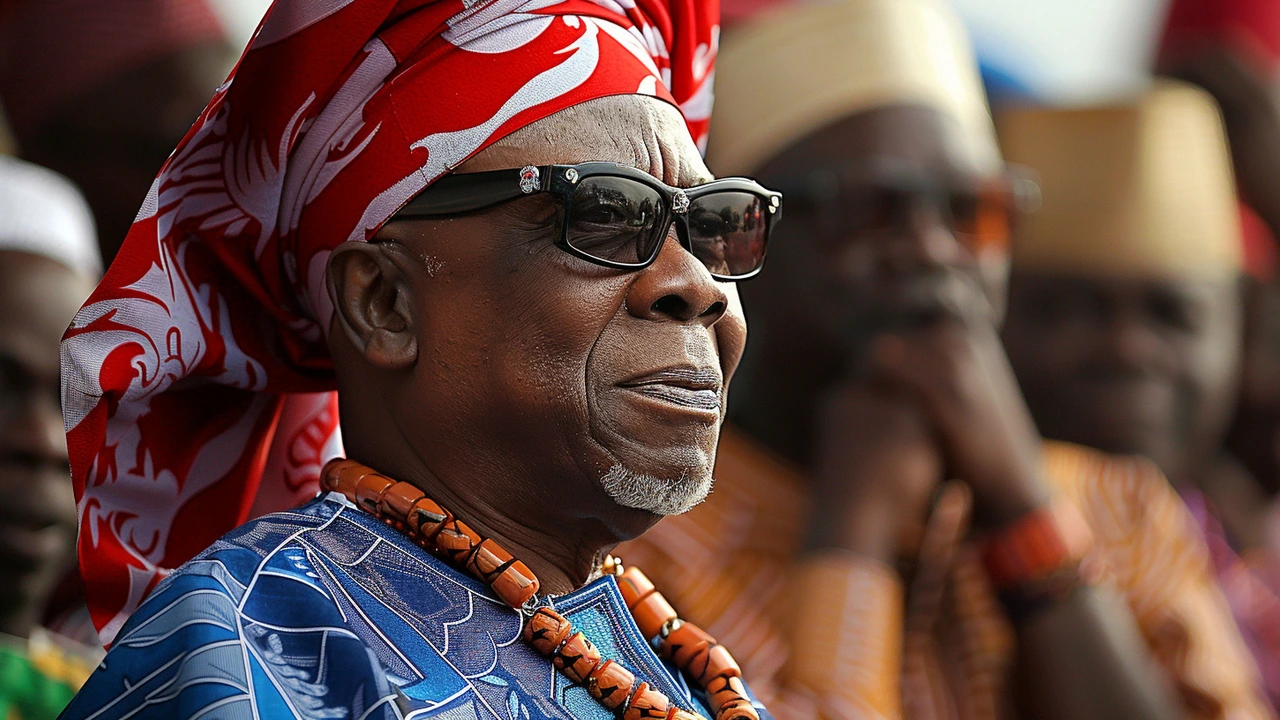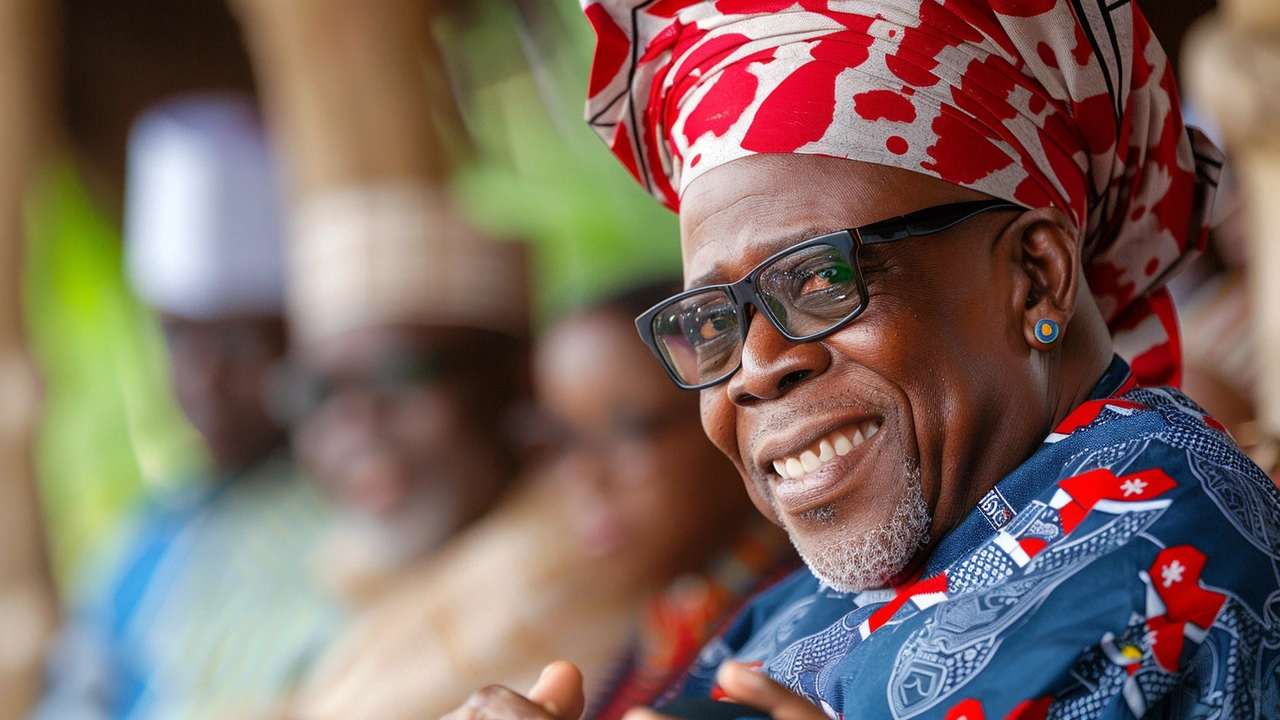President Tinubu’s Fall at Democracy Day: A Gesture of Respect or Mere Misstep?
The Democracy Day celebration in Nigeria took an unexpected turn when President Bola Tinubu experienced a fall at the Eagle Square event. For many, it appeared to be a random mishap, but the President offered a unique perspective on the incident. Speaking later at the Democracy Day dinner at the Presidential Villa, Tinubu humorously explained that the fall was, in fact, akin to the traditional Yoruba greeting known as 'dobale', a gesture of prostration, which he did in honor of democracy.
Tinubu sought to put a light-hearted spin on the situation, suggesting that it was a particularly well-executed move owing to his so-called 'swagger'. His comments, captured and shared widely across social media platforms, brought a wave of reactions from the public and political spectrums alike. While some citizens found his humor disarming, others raised questions about the nature of his fall and what it might signify about the President’s health and stability.
Immediate Reactions and Clarifications
In the immediate aftermath of the incident, Dada Olusegun, Tinubu’s media aide, quickly worked to manage public perception. He described the fall as a mild misstep, reassuring the nation that the President was not hurt. Olusegun’s clarification aimed to quell any rising anxieties among supporters and critics, emphasizing that there had been no significant consequences to Tinubu’s apparent stumble.
Yet, the incident inevitably became fodder for political opponents and commentators. Among those who reacted was Peter Obi, a prominent political rival, who expressed genuine concern for the President’s well-being. Obi’s remarks, seemingly devoid of any political undercurrents, invited a wave of empathy from his followers. On the other hand, Atiku Abubakar, another political figure, seized the opportunity to mock the President, transforming the incident into a moment of political theater.
Political Rivals and Public Perception
This divergence in responses from political opponents underscored the highly polarized landscape of Nigerian politics. While Obi's concern might have been interpreted as a form of sportsmanship, Abubakar’s mockery signaled the ruthless nature of political rivalry in Nigeria. Public discourse around the events at Eagle Square quickly evolved to reflect broader concerns about leadership and the physical fitness of those in power.
Tinubu's detractors, particularly on social media platforms, were quick to exploit the fall. Memes and hashtags proliferated, presenting the President's fall in various comedic and critical lights. For some, this was more than just a slip; it became a symbol of perceived inadequacies in Tinubu's administration. For his supporters, however, the incident presented an opportunity to rally around the President, applauding his attempt to downplay the fall with humor and grace.

The Cultural Context of 'Dobale'
In the Yoruba tradition, the act of 'dobale' is a significant gesture of respect and humility. Often performed by men, it involves prostrating oneself completely, usually in front of elders, to display deep respect. President Tinubu’s reference to 'dobale' infused the incident with cultural resonance, turning what could have been a purely embarrassing moment into a discourse on tradition and respect.
His interpretation of the fall as a purposeful act of prostration necessitates a nuanced understanding of Yoruba customs. In many African cultures, such physical demonstrations of respect are deeply ingrained and highly valued. By framing his fall within this context, Tinubu aimed to connect with his roots and perhaps, by extension, with a broader Nigerian audience that holds similar cultural values.
However, this explanation was met with both skepticism and support. Critics argued that invoking cultural traditions as a cover-up for a moment of clumsiness was disingenuous. Supporters, on the other hand, lauded Tinubu for bringing Yoruba customs to the fore, interpreting his fall as a powerful symbol of humility before democratic ideals.
The Road Ahead
As with many political incidents, the longevity of its impact depends on how it is managed in the aftermath. President Tinubu's response has been a mixture of humor and cultural referencing, a blend designed to neutralize negativity while fostering a sense of shared values. Yet, the challenge remains: moments like these can quickly transform into defining narratives in the fast-moving world of politics.
In the weeks following the celebration, political analysts and journalists alike will be watching closely to see how Tinubu’s administration navigates the criticism and support generated by this event. Instances of physical missteps by leaders are often subjected to intense scrutiny, not just within Nigeria, but globally. It brings into question not only the personal health of leaders but also the broader implications for their capacity to govern effectively.
For the Nigerian public, especially those supportive of Tinubu, the incident may become a minor footnote in a long political career. For his opponents, it’s an opportunity to fuel ongoing critiques of his administration. Moving forward, how Tinubu and his team manage the narrative around this fall may well influence his political capital.
A Moment of Levity in Serious Times
It's worth noting that amidst the multifaceted challenges facing Nigeria — from economic pressures to security concerns — moments of levity can offer a refreshing, albeit brief, reprieve. Tinubu's joking reference to his 'swagger' and swift turn to cultural explanation reflects an astute understanding of the power of narrative. Leaders who can laugh at themselves often disarm critics and win public sympathy. However, the fine line between genuine self-deprecation and perceived incompetence remains a tightrope that must be walked with care.
As this story continues to develop, Nigerians will undoubtedly keep a close eye on how their leader embodies the spirit of democracy — both in words and actions. In a country where public perception is a critical component of political success, every misstep, literal or figurative, becomes a litmus test for leadership.
Ultimately, President Tinubu's fall at the Democracy Day celebration and the subsequent explanations from his camp might serve as a broader metaphor for the delicate balance of power, tradition, and public image in Nigeria’s political landscape.


Comments (14)
What a graceful tumble, but hey, the swagger still shines!
Hey folks, the cultural angle here is pretty fascinating. The Yoruba "dobale" is a deep mark of respect, and Tinubu trying to link his slip to that shows a clever attempt to connect with heritage. Still, it's essential to keep the focus on governance while appreciating the symbolism. Remember, a little humor can go a long way in easing tension.
The President’s fall cannot be dismissed as mere clumsiness; it is a stark illustration of the physical vulnerabilities that accompany any position of power; moreover, the attempt to reframe it as a culturally resonant “dobale” is a calculated rhetorical maneuver; it seeks to turn a potential embarrassment into an emblem of humility before democracy; such symbolism, however, must be scrutinized against the backdrop of Nigeria’s pressing challenges; citizens are less concerned with choreographed gestures than with tangible policy outcomes; the incident, while visually striking, diverts attention from the substantive debates on security and the economy; that diversion is precisely what opposition figures exploit, presenting the slip as evidence of frailty; yet, every leader is human, and a single misstep does not equate to incapacity; the real test lies in the administration’s response to the nation’s crises; if the government continues to prioritize performative acts over practical solutions, the “dobale” narrative will ring hollow; conversely, if Tin‑Bolu’s team leverages this moment to engage with the public in earnest discourse, it could restore some goodwill; the cultural reference to Yoruba tradition, while authentic in spirit, must not be wielded as a shield against accountability; it should instead serve as a reminder that leadership demands both respect for heritage and responsibility for progress; the media’s role, therefore, is to balance coverage of the spectacle with rigorous analysis of policy; only through that balanced lens can citizens assess whether the fall was a symbolic gesture or a portent of deeper issues.
Man, that tumble was wild!!! I swear the President just turned the whole thing into a circus act... just wow...
It’s nice to see a leader try to keep things light. A little humor can humanize a presidency and bridge gaps. I hope the health checks are all good, though. The people deserve both respect and transparency. Keep the optimism flowing!
While the narrative attempts to recast a mishap as cultural homage, one must interrogate its efficacy. Does this deflection diminish legitimate concerns regarding executive stamina? The discourse should not be eclipsed by performative grandeur. A measured critique remains essential. Let us not overlook substantive policy scrutiny.
In the grand theater of politics, every stumble becomes a metaphor for systemic inertia.
Ah, the art of turning a slip into a profound lesson-truly, the hallmark of post‑modern leadership.
The nod to "dobale" actually showcases a genuine cultural touchstone. It reminds us that political gestures can carry deep-rooted meaning. Still, the core issues remain unchanged.
Well, that was a spectacular display of… well, something. The swagger certainly survived the fall.
Let’s not get carried away praising a simple misstep. The focus should stay on governance, not theatrics. Yet, drama does keep us entertained.
Oh, the drama! A president flawless in speech, yet humbled by a slip. Who needs policy when you have performance? Still, every cameo has its aftermath.
Nice jab, but remember, a good coach always finds the teachable moment-even in a tumble.
Observing all this, it’s clear the real takeaway is the need for steady leadership. Let’s keep an eye on policy, not just performances.